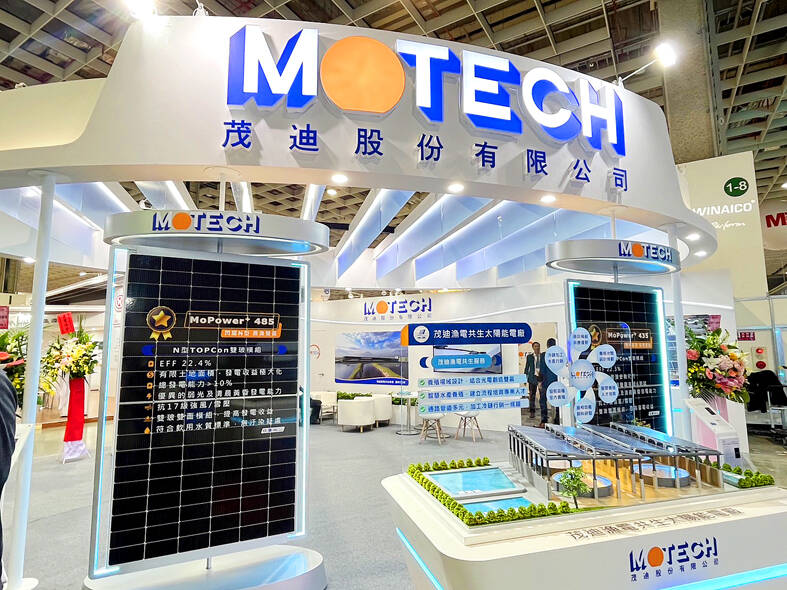Solar cell module maker Motech Industries Inc (茂迪) yesterday reported that net profit last quarter jumped 234 percent to NT$78 million (US$2.42 million) from the second quarter as it shipped more high-margin modules equipped with N-type TOPCon solar cells.
However, on an annual basis, net profit dropped 19.6 percent from NT$97 million.
Earnings per share were NT$0.2, up from NT$0.06 a quarter earlier, but down from NT$0.25 a year earlier, it said.

Photo: Chang Huei-wen, Taipei Times
Gross margin climbed to 15.6 percent from 13.3 percent in the April-to-June period and 13.7 percent from a year earlier.
Robust demand from overseas, primarily Japan, also drove shipments higher and improved the company’s financial performance, Motech spokesman Ting Wang (王丁召) told investors.
“The company’s business hit a trough in the second quarter and started to rebound in the third quarter,” Wang said.
Motech said it expects revenue this quarter to be little changed from NT$955 million last quarter, as sales would improve this month and next month from a low of NT$222 million last month.
Domestic solar companies are suffering due to an unfavorable external environment in the second half of this year, as large-scale solar project developers are slowing the pace of solar installments ahead of the Jan. 13 presidential elections, the company said.
“The impact is enormous,” Wang said. “Besides, it is time-consuming to go through the paperwork from different government agencies to install solar panels above fishing ponds. It took much longer than we expected.”
Motech holds a cautious outlook regarding market demand next year and hopes to have a better picture of demand after the elections, Wang said.
The company will continue upgrading its production lines to maintain its technology leadership, he said.
Motech is ahead of its peers in receiving certification for the new generation of M10 solar panels and plans to convert all of its M6 solar panels to larger M10s from June next year, Wang said.
The conversion would help boost its domestic annual capacity to about 400 megawatts from 350 megawatts this year, Wang said.
Motech also plans to upgrade its factory in Maanshan in China’s Anhui Province, which has an installed capacity of 300 megawatts, he said.

Nvidia Corp CEO Jensen Huang (黃仁勳) is expected to miss the inauguration of US president-elect Donald Trump on Monday, bucking a trend among high-profile US technology leaders. Huang is visiting East Asia this week, as he typically does around the time of the Lunar New Year, a person familiar with the situation said. He has never previously attended a US presidential inauguration, said the person, who asked not to be identified, because the plans have not been announced. That makes Nvidia an exception among the most valuable technology companies, most of which are sending cofounders or CEOs to the event. That includes

TARIFF TRADE-OFF: Machinery exports to China dropped after Beijing ended its tariff reductions in June, while potential new tariffs fueled ‘front-loaded’ orders to the US The nation’s machinery exports to the US amounted to US$7.19 billion last year, surpassing the US$6.86 billion to China to become the largest export destination for the local machinery industry, the Taiwan Association of Machinery Industry (TAMI, 台灣機械公會) said in a report on Jan. 10. It came as some manufacturers brought forward or “front-loaded” US-bound shipments as required by customers ahead of potential tariffs imposed by the new US administration, the association said. During his campaign, US president-elect Donald Trump threatened tariffs of as high as 60 percent on Chinese goods and 10 percent to 20 percent on imports from other countries.

Taiwanese manufacturers have a chance to play a key role in the humanoid robot supply chain, Tongtai Machine and Tool Co (東台精機) chairman Yen Jui-hsiung (嚴瑞雄) said yesterday. That is because Taiwanese companies are capable of making key parts needed for humanoid robots to move, such as harmonic drives and planetary gearboxes, Yen said. This ability to produce these key elements could help Taiwanese manufacturers “become part of the US supply chain,” he added. Yen made the remarks a day after Nvidia Corp cofounder and chief executive officer Jensen Huang (黃仁勳) said his company and Taiwan Semiconductor Manufacturing Co (TSMC, 台積電) are jointly

MARKET SHIFTS: Exports to the US soared more than 120 percent to almost one quarter, while ASEAN has steadily increased to 18.5 percent on rising tech sales The proportion of Taiwan’s exports directed to China, including Hong Kong, declined by more than 12 percentage points last year compared with its peak in 2020, the Ministry of Finance said on Thursday last week. The decrease reflects the ongoing restructuring of global supply chains, driven by escalating trade tensions between Beijing and Washington. Data compiled by the ministry showed China and Hong Kong accounted for 31.7 percent of Taiwan’s total outbound sales last year, a drop of 12.2 percentage points from a high of 43.9 percent in 2020. In addition to increasing trade conflicts between China and the US, the ministry said